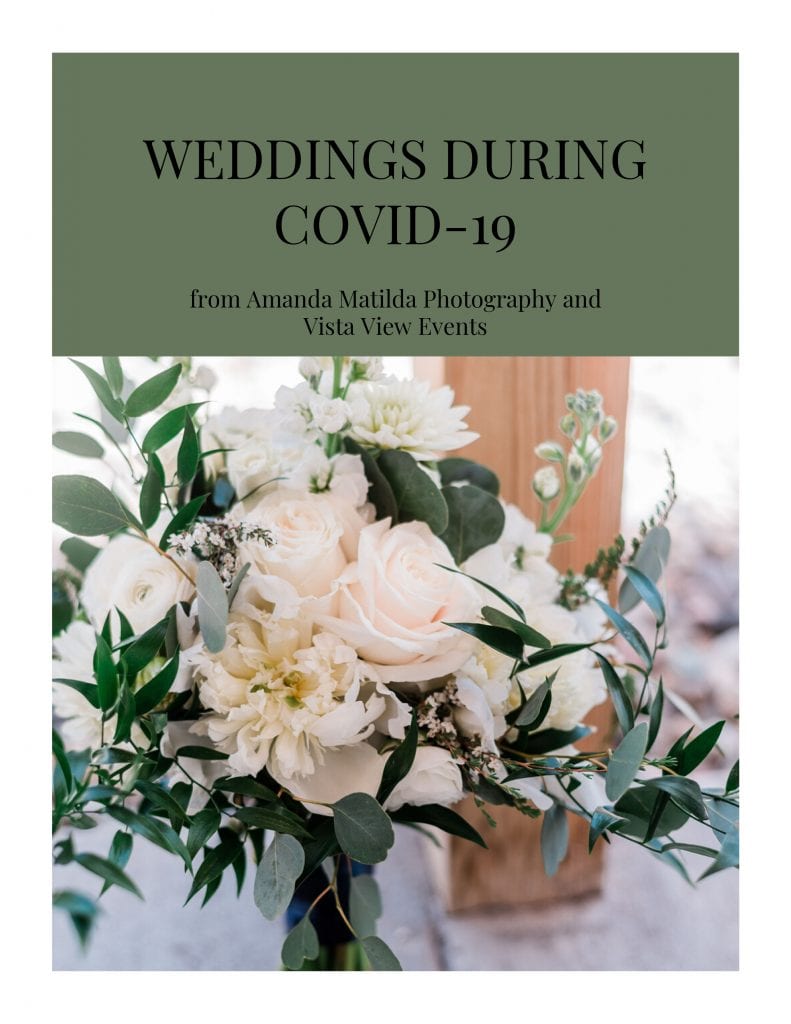There are so many resources out there by now for couples whose weddings have been affected by COVID-19, from how to reschedule your wedding, to email templates for downsizing or postponing your celebration, and “change the date” cards to send to your guests. One resource that has been missing through all of this is what couples and vendors can expect for weddings happening after quarantine. What do weddings during COVID-19 look like when stay-at-home mandates have lifted? Together with Kinsey Roberts, co-owner of Vista View Events, we’ve created what we hope is a helpful resource for what we believe weddings can reasonably expect for the foreseeable future. We’re not doctors, just wedding pros working to help guide couples through this bizarre time!
[convertkit form=1337220]
Wedding Sizes During COVID-19
Probably the biggest reality we foresee for weddings during COVID-19 is a reduced guest count. Depending on your state’s restrictions at the date of your wedding, it is not unlikely that group numbers will be limited at least through the summer, if not the rest of the year. The three phases for reopening recommended by the federal government dictate an initial phase of groups limited to ten people, followed by groups of no more than 50, before finally relaxing all regulations. For weddings scheduled the remainder of 2020 and expecting 100 guests or more, you should consider whether you are okay with trimming back your guest count, or if you prefer to reschedule to a later date without restricted group numbers.
It’s very possible also that travel will be somewhat more restricted during this time as well, which could naturally affect your guest counts. Some of your wedding pros may not be able to travel to your destination if they are coming from out of state and their states have restrictions on travel, so keep that in mind too.
Reach out to your whole team early to see how they’re expecting to move forward, and how they will accommodate if by your wedding date any new restrictions have been put in place. Do your vendors have a backup plan in place with local pros if they are suddenly unable to come, whether it’s from restrictions or their own illness? These are questions you need to ask sooner rather than later.
Precautions for Pros at Weddings During COVID-19
Next, let’s explore what precautions you can expect to see from vendors at weddings in 2020 after quarantine. Masks, plastic gloves, and reduced staff as needed could all be advised for your wedding team based on state and federal regulations. Even if your area is not actively promoting masks or gloves, it could still be common for vendors to use these precautions to protect themselves and your guests on your wedding day. As bizarre as it will probably feel, you should expect not to hug or shake hands with your wedding team as well, which can be one of the harder adjustments for us to make!
Caterers will likely need to adjust their serving workflow to exclude community serving areas at weddings during COVID-19. Think about the choice of shared sauces for a BBQ buffet or cups of utensils for guests to grab out of. Dinnerware will need to be set at the tables for guests so that everyone is not picking from the same pile of plates, utensils, or napkins, even if the dinnerware is disposable. It is also reasonable to expect multiple hand sanitizer stations around your venue for both guests and vendors to maintain healthy hand hygiene.
Photo booths could be tricky during this time as well, with guests traditionally sharing props from person to person, which could transmit the virus. Your photo booth team should have a solid sanitation practice in place after each prop’s use, or it might be best to forgo it.
Weddings and Social Distancing
Social distancing is likely not going anywhere any time soon. Your venue will follow your local area’s group size guidelines, and you should expect private residences to adhere to these restrictions as well. Remember that these maximum numbers will include your vendors, too, so don’t forget them in the final count as well!
Ceremony and reception seating will need to be designed to comply with social distancing recommendations. This could mean trimming your wedding party size, or having them sit during the ceremony instead of stand with you. If it’s important to you to have someone stand, you could have your Maid of Honor and/or Best Man stand with you during the ceremony at a distance. Guests’ seating will need to be more dispersed as well. On benches guests could be limited to a number of guests per bench, or in chairs you could space them out to comply with social distancing.
For the wedding reception, expect to seat fewer guests per table, for instance a table for eight is now a table for four. You can expect all buffets to be manned by catering staff, to remove the issue of guests sharing serving utensils. Venues/caterers may ask for guests to clear their own waste, particularly if it’s disposable (which is definitely recommended during this time) so there’s less interaction with dinnerware that has come into contact with a person’s mouth.
Dancing is one of the bigger unknowns for weddings during COVID-19. Couples could restrict dancing so guests only dance with those they’ve been quarantining with. Perhaps a maximum number of people on the dance floor at a time is the solution. If possible, creating a larger dance floor is a great start so that guests can remain spread out. Social distancing recommendations should not be forgotten on the dance floor!
Trimming Your Guest Count
If your wedding is still scheduled for 2020, you can realistically expect to receive much lower RSVP rates, whether guests are unable to travel due to restrictions or just personal choice. That doesn’t mean you don’t need to consider how COVID-19 may still affect your wedding though! The reality is you should still have a plan in place should you need to trim down your guest count to comply with gathering maximums, or reschedule your celebration.
It is not an easy decision whether you need to trim your guest count or postpone your wedding to another date. If you’ve made the decision to lessen your guest count and move forward according to your state’s group maximums, it’s important to communicate this with guests. You can do so through your wedding website, group texts, mass emails, or through social media.
Ask your wedding party and parents to help with this communication if it feels overwhelming. A wedding planner may be able to help as well. Make sure your guests know they were invited because you love them, and that you’re only reducing guest counts to keep them safe. If you’re planning a party for a later, safer date, include those hopes as well. Your guests love you and will understand!
Fall 2020 couples, if you haven’t sent your invitations yet, we strongly recommend to add a note that you’re excited to welcome everyone, but will stay in touch regarding any gathering maximums due to COVID-19. This makes guests aware that you’re keeping an eye on the situation and will do what’s best to keep everyone safe.
You could choose to stream your wedding ceremony so those who can’t attend in person, whether by choice or restriction, can still be part of your day. Zoom, Skype, Youtube live or Facebook/Instagram live all serve as great options to stream your ceremony for those attending virtually!
Weddings during COVID-19 will certainly look different than they did in the past. It is important to understand the realities we will be living with for the foreseeable future, so you can make an informed decision on how to move forward with your celebration. Whether you choose to embrace the “new normal” with reduced guest counts and precautions, or you ultimately decide to reschedule to a later date, you will still have your wedding and it will be beautiful! At the end of the day, the most important thing is your love and committing to forever.
We’re in this together!
[convertkit form=1337220]



